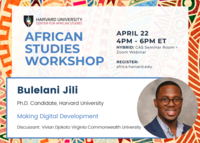Date:
Location:

The African Studies Workshop at Harvard continues this year with a new and exciting schedule of presenters. The presenters' papers explore Africa’s changing place in the world - and the new economies, legalities, socialities, and cultural forms that have arisen there. We shall also interrogate the claim that the African present is a foreshadowing of processes beginning to occur elsewhere across the globe; that, therefore, it is a productive source of theory and analysis about current conditions worldwide. At each workshop, a scholar presents a paper on one facet of the rapidly changing position of Africa in the global political economy and the impact of that change on global distributions of wealth, well-being, and power. Then a discussant provides commentary followed by an open discussion, in which students are given the floor first, followed by anyone else in attendance. Workshop presenters are scholars of high international repute as well as up-and-coming Africanist intellectuals.
Join us on April 22nd from 4-6 pm for the Spring 2024 African Studies Workshop with Bulelani Jili presenting: Making Digital Development
Discussant: Vivian Djokoto Virginia Commonwealth University
Abstract: This work examines the nature of faith in the technological fix and the consequences of Kenya’s global engagements with corporate and foreign partners in the pursuit of digital development. Amidst a range of various kinds of technical artifacts, I focus here on Information and Communications Technology (ICT), which has been the focal point of the most extravagant hopes for enhancing state capacity to maintain social order and catalyze development. As such, it has also been a generative site, which has inspired the greatest trepidation over its capabilities to augment Chinese state espionage, enhance the control of authoritarian states, and expand Beijing’s imperial reach. Thus far, a limited number of studies have drawn attention to the multiple uses, proprieties, and meanings of Chinese ICT in African local environments. Put more concretely, this work explores how digital tools are constructed as modalities of social intervention. These modalities, I show, obfuscate the local contingents that maintain development challenges, but also add to the fiction of technology as a smoothly functioning instrument that accords a reliable solution to development’s tardiness in Africa. In this view, the object of postcolonial thought is in part about disrupting the teleological presumptions of modernity. Accordingly, problematizing the entangled peripheral and core (Wallerstein, 1979), contingencies that make neocolonialism resilient. Scholars like Bhabha (1994) call for intellection to be derivative of observations made from the periphery. As such, this peripheral angle of vision seeks to provincialize Europe and demystify China in Africa as a way to recover endogenous ways of seeing whose genealogies do not simply stretch back to the Enlightenment. To critique presuppositions surrounding technologies’ promises and the speculated futures that are embedded in its installation, it offers a decentered or “ex-centric” way of seeing that unpacks the work of technology while also making possible an ethnographic exercise to capture African experiences of digital development.
Bulelani Jili is a Ph.D. candidate at Harvard University, where he is a Meta Research PhD Fellow. His research interests span Africa-China relations, cybersecurity, ICT development, law, and more. He is also a Fellow at Yale Law School, the Atlantic Council, and the Belfer Center, and he is conducting research with the China, Law, Development project at Oxford University, aiming to understand the nature of the order that underlies China’s new globalism. He has advised leading think tanks and governments, and his writing has appeared in publications including African Affairs, Nature, South China Morning Post, The Economist, Mail and Guardian, and Politico. Prior to attending Harvard, Bulelani worked at the Wits Institute for Social and Economic Research in South Africa as a Visiting Researcher. He earned an M.Phil. from Cambridge University, an M.A. in Economics from Yenching Academy of Peking University, and an A.B. honors, in Philosophy, Politics, and Economics from Wesleyan University, where he was a Pfeiffer scholar.
